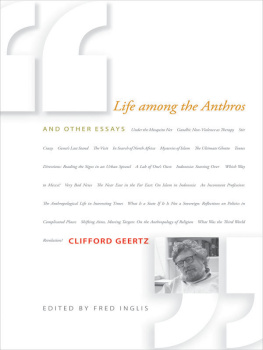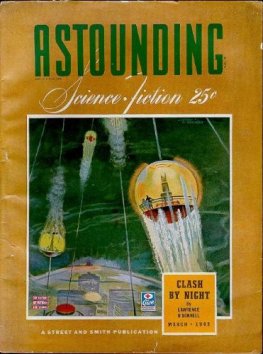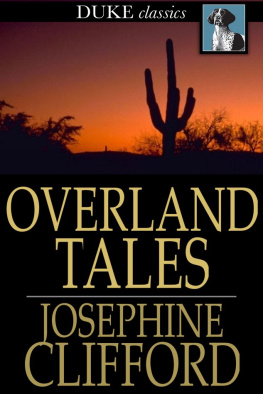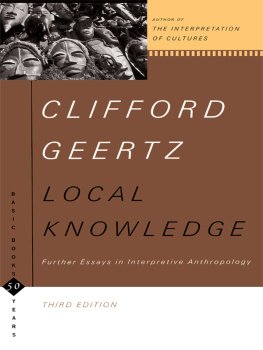Geertz Clifford - Life among the Anthros and Other Essays
Here you can read online Geertz Clifford - Life among the Anthros and Other Essays full text of the book (entire story) in english for free. Download pdf and epub, get meaning, cover and reviews about this ebook. City: Princeton;N.J, year: 2012, publisher: Princeton University Press, genre: Detective and thriller. Description of the work, (preface) as well as reviews are available. Best literature library LitArk.com created for fans of good reading and offers a wide selection of genres:
Romance novel
Science fiction
Adventure
Detective
Science
History
Home and family
Prose
Art
Politics
Computer
Non-fiction
Religion
Business
Children
Humor
Choose a favorite category and find really read worthwhile books. Enjoy immersion in the world of imagination, feel the emotions of the characters or learn something new for yourself, make an fascinating discovery.
- Book:Life among the Anthros and Other Essays
- Author:
- Publisher:Princeton University Press
- Genre:
- Year:2012
- City:Princeton;N.J
- Rating:4 / 5
- Favourites:Add to favourites
- Your mark:
- 80
- 1
- 2
- 3
- 4
- 5
Life among the Anthros and Other Essays: summary, description and annotation
We offer to read an annotation, description, summary or preface (depends on what the author of the book "Life among the Anthros and Other Essays" wrote himself). If you haven't found the necessary information about the book — write in the comments, we will try to find it.
Life among the Anthros and Other Essays — read online for free the complete book (whole text) full work
Below is the text of the book, divided by pages. System saving the place of the last page read, allows you to conveniently read the book "Life among the Anthros and Other Essays" online for free, without having to search again every time where you left off. Put a bookmark, and you can go to the page where you finished reading at any time.
Font size:
Interval:
Bookmark:

LIFE AMONG THE ANTHROS AND OTHER ESSAYS
Copyright 2010 by Princeton University Press
Published by Princeton University Press, 41 William Street, Princeton, New Jersey 08540
In the United Kingdom: Princeton University Press, 6 Oxford Street, Woodstock, Oxfordshire ox20 1TW
All Rights Reserved
Library of Congress Cataloging-in-Publication Data
Geertz, Clifford.
Life among the anthros and other essays / by Clifford Geertz, edited by Fred Inglis.
p. cm.
Includes bibliographical references and index.
ISBN 978-0-691-14358-3 (alk. paper)
1. AnthropologyPhilosophy. 2. AnthropologyResearch. 3. AnthropologyFieldwork. I. Inglis, Fred. II. Title.
GN33.G44 2010
301.01dc22
009043977
British Library Cataloging-in-Publication Data is available
This book has been composed in Adobe Garamond
Printed on acid-free paper.
press.princeton.edu
Printed in the United States of America
10 9 8 7 6 5 4 3 2 1
LIFE AMONG THE ANTHROS AND OTHER ESSAYS
INTRODUCTION
The Comic Vision of Cliff ord Geertz
I
Once upon a time, in October 1988, just weeks before the cold war swallowed itself in a tumble of falling masonry in Berlin, overloaded Trabants pouring past the raised barriers at Hungarian checkpoints, a sea of vengeful fists and faces booing their hateful overlord off his balcony in Bucharest, a full-page advertisement in affirmative defense of being a liberal appeared in the New York Times.
An unorganized group of prominent academics and intellectuals had united briefly to pay up in order to rebut their president, the amiable, lethal, hotly ideological, charmingly anti-intellectual Ronald Reagan, who had turned liberal into a term of open and contemptuous abuse.
It has pretty well stayed that way, the forty-third president notwithstanding, for the succeeding twenty-odd years. The signatories said:
Extremists of the right and of the left have long attacked liberalism as their greatest enemy. In our own time liberal democracies have been crushed by such extremists. Against any encouragement of this tendency in our own country we feel obliged to speak out.
Cliff ord Geertz was one of the signatories. He had never been a fellow traveler of a marxisant persuasion, still less the kind of fundamental federalist the U.S. government hired to do its dirtiest work in Indochina and in Chile. He was a quiet American, all right, but he spoke in the purest accents and very rapidly the active, historical, self-critical, and unmartyred liberalism which John Dewey took from John Stuart Mill and Thomas Hill Green, and turned it into the plain prose of the best that Americans thought and said in the twentieth century.
In one of his finest essays, in which he sought to identify both the moral point and the common ground of all inquiry into the human sciences,famous collection of essays, and Geertzs essay was given as a Trilling Memorial Lecture at Columbia. Those tropes includedin one of Geertzs characteristic, inclusive, and disorienting liststhe integrity of other cultures; the sanctity of all human life (cruelty toward which is, for liberals, the one worst thing, so Richard Rorty says); the principle of equality as between men and women, supremely, but also as between classes, races, and generations; and the always mixed but largely brutal and desolate legacy of colonialism.
Typically, Geertz interpolates a parenthesis before his list, saying of the liberal imaginationthe making and remaking of which he takes as his subject and his lifes workthat it is an imagination, Id best confess, I more or less share, that more or less being the weightiest part of his confession, an aside which propels him to that edge of the stage from which the moral and intellectual commentator on human goings-on can best speak: near the exit but still an actor, perfectly audible but sotto voce; judging the action but not inflecting it; speaking always with as much intelligence, precision, and beauty as he knows how.
Not that this minor lord-at-court is detached from the actionsor only as detached as he can manage and keep his balance. Indeed, Geertz is programmatically off-balance, always seeking out those moments where momentum veers and those moral truths about ourselves and others which, our having supposed them to be fairly dependable, suddenly elude us in ways typical of any imaginative construction capable, first, of gripping us, and then of changing, however slightly, the direction of our lives (King Lear, Cosi Fan Tutte, the end of cold war, the natures of Islam, the making of a president).
So the lesson of that essay and of Geertzs life is this: that we apprehend other lives not by trying to get behind the elaborate behaviors and ideas with which they dramatize their being, but by seeing through (the pun holds up) the spectacles which constitute their meanings and their minds.
This business of seeing through the lenses you happen to have picked up and got used to goes very deep. When you remove your spectacles, its hard to see anything. Good ones are custom-made; they will hardly suit anybody else. So it is with the glasses ground by liberalism. Geertz put his name and his reputation to the advertisement in the New York Times because he and his associates rightly felt that, catchall term that it is, their common property marked out as liberalism was being wantonly defiled by the abuse of mere power. And in the name of what? In the namesno doubt, the mixed and motley namesof neoconservatism, or the doctrine of small government and big money; of old nationalism, or the certainty of American righteousness; of a Godhead confidently enlisted on the side of both big money and Old Glory.
The fragments of liberalism were to be shored against these rough and ruinous beasts, and in the more than twenty years since the advertisement appeared, there has been a hidden, unfinished, and titanic struggle going on for the soul of America as it flickered elusively behind and between the stipulations and amendments of the Constitution.
Geertz remained an undaunted and tireless officer in the liberal vanguard, never more so than in the pages of the New York Review of Books. It is, however, the very nature of his intellectual achievementas you might say, the magnification and varifocalism of the lenses he has groundto put freedom or variety of seeing, the sheer multifariousness of the ways there are of being human, the certainty that differing people will live and die for these extreme peculiarities, bang in the center of his and our vision.
Once one can see the strangeness of other people as familiar, then the familiarity of ones own streets becomes estranged. This is a liberalism with a strong tinge of realism. As Geertz himself wrote,
We can at least say something (not of course that we always do) with some concreteness to it. I have never been able to understand why such comments as your conclusions, such as they are, only cover two million people [Bali], or fifteen million [Morocco], or sixty-five million [Java], and only over some years or centuries, are supposed to be criticisms. Of course, one can be wrong, and probably, as often as not, one is. But just or merely trying to figure out Japan, China, Zaire, or the Central Eskimo (or better, some aspect of their life along some chunk of their world line) is not chopped liver, even if it looks less impressive than explanations, theories, or whatnot which have as their object History, Society, Man, Woman, or some other grand and elusive upper-case entity.
One cannot doubt that such a thing can be called liberalism; the concept of freedom is intrinsic to it, but that freedom is itself a constitutive value. It is not merely the desirable, nonmoral circumstance of actionfreedom to and freedom from as Isaiah Berlin had it. It is the
Next pageFont size:
Interval:
Bookmark:
Similar books «Life among the Anthros and Other Essays»
Look at similar books to Life among the Anthros and Other Essays. We have selected literature similar in name and meaning in the hope of providing readers with more options to find new, interesting, not yet read works.
Discussion, reviews of the book Life among the Anthros and Other Essays and just readers' own opinions. Leave your comments, write what you think about the work, its meaning or the main characters. Specify what exactly you liked and what you didn't like, and why you think so.








